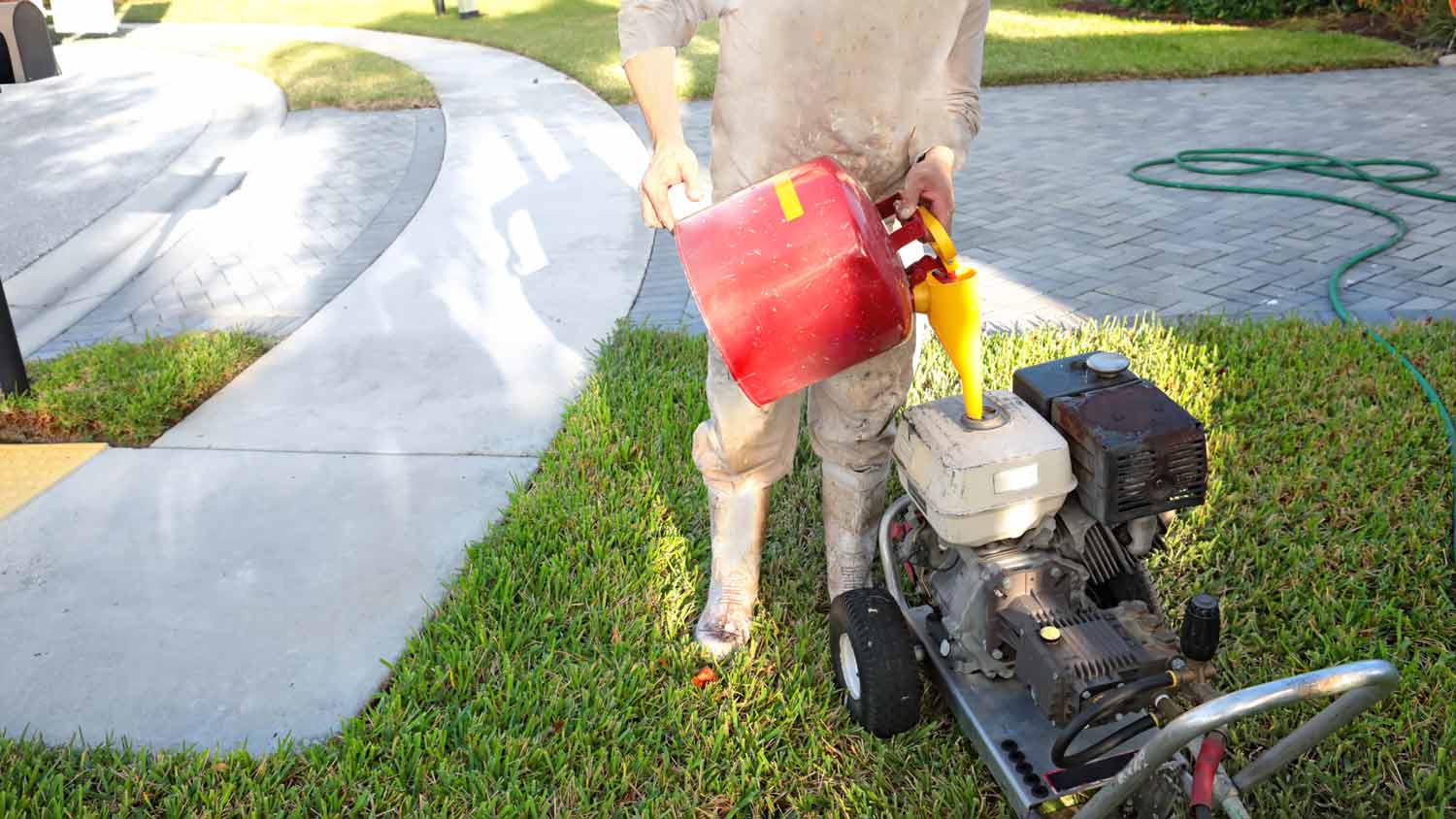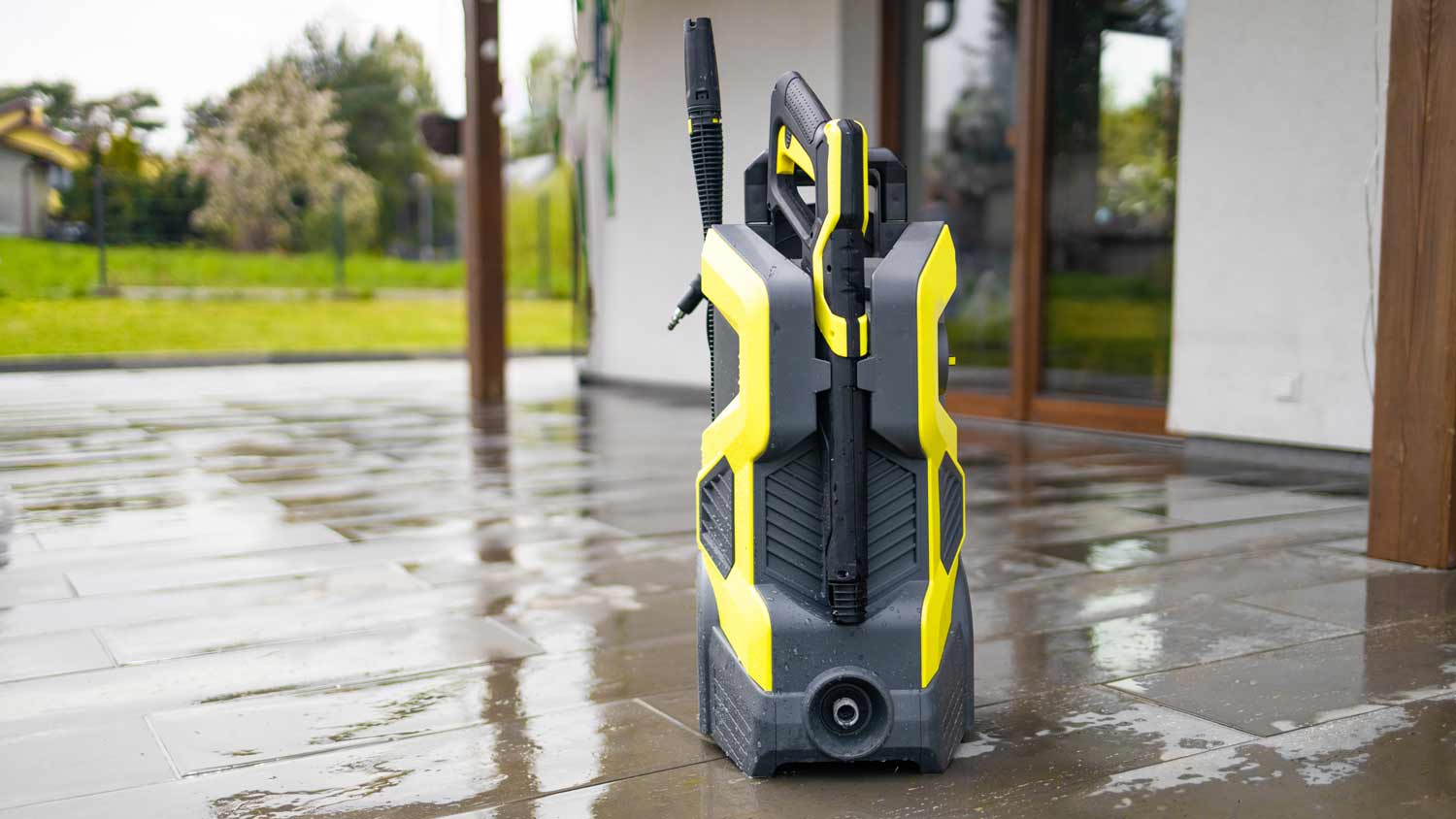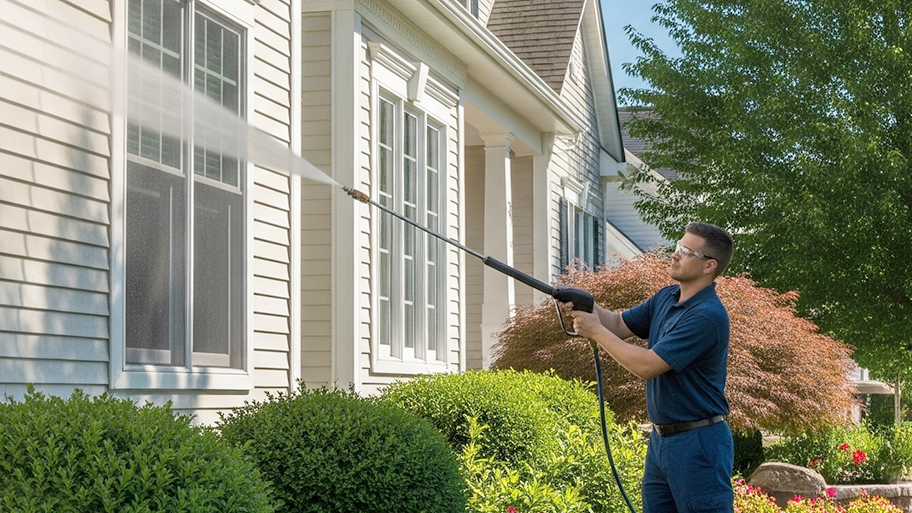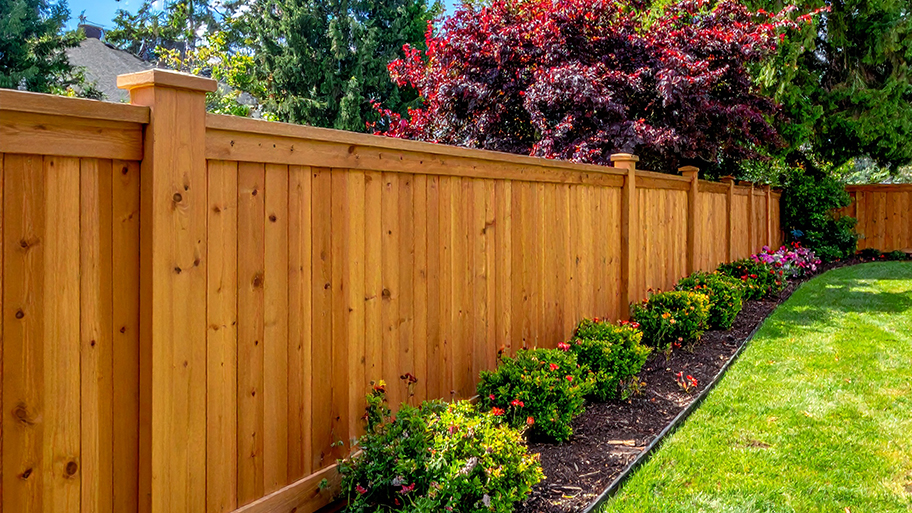
The cost to pressure wash a deck depends on its size, condition, material, and whether you DIY the job. Help set your budget with this cost guide.
Choose the right temperature for the job


Power washers use hot water, while pressure washers use cold water.
Hot water reduces your cleaning time and makes short work of oil and grease.
Cold water is great for gentler cleaning tasks, like blasting away mud.
Power washers that use hot water can be too harsh for many surfaces.
When looking to clear away grime from a patio or exterior wall, you may wonder if a hot water pressure washer or a cold water pressure washer is the right tool for the job. While highly efficient, using heated, pressurized water can also damage the surface you’re trying to clean, so it’s important to be informed ahead of time about which tool is right for your job. Here’s everything to know about the debate between hot vs. cold pressure washers, just in time for your next backyard shindig.

Hot water pressure washers are typically called power washers, but this varies depending on the region and the specific tool manufacturer. These machines heat up water to a designated temperature and then use pressure to create a narrow and powerful beam of water. Hot water helps break down stubborn dirt and grime, making your project go a lot faster, but it’s too harsh for many surfaces like wood and aluminum. That said, if what you’re washing can stand the heat, the power washing before and after will be worth the effort.
Fast and efficient. One of the main reasons people flock to pressure washers is the speed at which they clean. Hot water units take this even further, with increased efficiency across all appropriate cleaning tasks.
Great for oil and grease. When cleaning an oily pan after dinner, you soak it in hot water, right? The same holds true with pressure washers. These machines blast through oil and grease, making them ideal for cleaning driveways and any other grease magnets around your yard.
Requires less detergent. Hot water machines require less detergent than their cold water cousins. This doesn’t save a heap of money, but every little bit helps.
More expensive. Hot water pressure washers cost more to buy and run than cold water units. The machine itself can be up to twice as expensive as a cold water washer, plus they require more power to heat the water.
Can damage your property. As much as you’d like to blast everything you own with a pressure washer, it can be too much for many materials to handle, and heating the water can be even more damaging. Materials like wood siding and your glass windows should never be exposed to the power of a heated pressure washer.
Requires more maintenance. Hot water pressure washers boast a number of unique components to heat the liquid to your desired temperature. These parts break or wear down over time, requiring maintenance. Generally speaking, these machines should be cleaned after every use.

Most pressure washers use cold water, and these units are used the world over by pros and amateurs alike. There are many different uses for pressure washers, but cold water models excel with caked-on grime and dirt.
Less expensive. While buying any pressure washer is more expensive than hiring a local pro pressure washer for a single job, cold water models are more budget-friendly than hot-water models. Since they’re more popular, you’ll also find models at a range of prices, so you’re sure to find one that fits your budget.
Works for many tasks. From cleaning the dusty driveway to stripping paint off your old deck, these units get the job done. Cold water pressure washers excel at cutting through dirt, grime, and all of the usual suspects without causing damage, as long as you’re using the right power settings.
Maintenance is a breeze. When compared to hot water pressure washers, maintaining cold water machines is an absolute treat. Just empty the tank and clean it every once in a while, and you should be good to go. Winterizing your pressure washer isn’t too challenging either, especially for an electric model.
They use a lot of water. If your area places restrictions on water usage, look elsewhere. Cold water pressure washers go through tons of water with each use, even when compared to hot water models.
Struggle with tough stains. In addition to having a hard time with oil and grease, cold-water washers can struggle to adequately eliminate tough stains that have been sitting around for a while. This could require multiple attempts, hand-washing, or switching to a hot-water model.
Require more pressure. Cold water models often have to use more pressure than hot water ones to get the job done. Practice with lower PSI settings, wear safety gear, and never wear open-toed shoes when using these machines.

These machines are very similar, but the temperature variance switches things up. Here’s how that shakes out in some real-world scenarios.
Cold water pressure washers are great for dirt and caked-on grime but not for deep stains or for clearing away oil and grease. However, just because hot water washers are more powerful doesn’t mean you need all of that power. For most jobs, a cold water machine works just fine.
Most powerful: Hot water pressure washers
The whole reason people flock to pressure washers in the first place is speed. No matter the type, using a pressure washer is much, much faster than cleaning something by hand. However, hot water machines are faster in the end.
Faster: Hot water pressure washers
No matter how you slice it, a pressure washer is a significant investment, which is why so many people choose to rent instead of buy. If you are on a budget but renting doesn’t appeal to you, go with a cold water model. These range from $100 to $1,000, while hot water pressure washers usually start at $1,000 and go up from there. As an aside, hiring a pro to pressure wash your home costs around $200 to $420.
More budget-friendly: Cold water pressure washers
If you are the set-it-and-forget-it type, a cold water washer is the better fit. These machines don’t require too much maintenance aside from general cleaning. On the other hand, hot-water pressure washers require oil changes, air filter changes, the emptying of drain valves, and a variety of tasks to ensure the heating coil stays in tip-top shape.
Easier to maintain: Cold water pressure washers
There is an element of risk in all pressure washers as they create focused streams of highly pressured water. With that said, hot water pressure models tend to require less pressure than cold water models. This leads to a reduced chance of accidental injury or property damage as long as you are wearing the appropriate safety gear. Though safer in this regard, hot water machines spew out liquid in temperatures up to 250 degrees Fahrenheit, which carries its own set of risks to your property and person.
Safest option: It’s a draw.
From average costs to expert advice, get all the answers you need to get your job done.

The cost to pressure wash a deck depends on its size, condition, material, and whether you DIY the job. Help set your budget with this cost guide.

Need to breathe new life into your dirty siding and trim? Explore the cost to pressure wash a house to boost your curb appeal instantly.

Pressure washing your fence can restore its appearance and keep your home looking great. Learn how much it costs based on factors like square footage and material.

Who power washes houses? Hiring a power washing professional is the best choice, as this expert has the know-how and equipment to do the job correctly.

Impress the neighbors by sprucing up your siding and refreshing your roof. Use this guide to learn how to clean the exterior of a house–just like a pro.

Jet washing, or pressure washing, uses an intense stream of cold or room temperature water to clean surfaces.